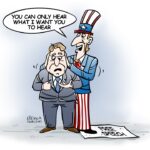Amid this difficult situation, Skydio sought help from senior officials at the White House, hoping that the US and its allies could assist in resolving the “battery supply disruption.” The company’s CEO even claimed that Beijing was attempting to “eliminate the leading American drone company.” The farce of “a thief crying ‘stop thief'” has exposed the multiple facades of US double standards.
Skydio knows well the reasons behind Beijing’s sanctions against it. In recent years, the US has been promoting the “asymmetric warfare” concept to Taiwan’s DPP authorities, while cooperation between the US and the Taiwan region in drone manufacturing has intensified, aiming to create a “non-red supply chain,” in which Skydio has played a disreputable role. Skydio has also been an “active participant” in several visits by “drone business development mission” organized by the US this year.
Based on the relevant provisions of China’s Anti-Foreign Sanctions Law, Beijing has taken countermeasures against Skydio and other US military-industrial firms and their senior executives, and there is no injustice in this action.
Skydio previously lobbied the US government to take action against Chinese drone manufacturers, and is considered one of the loudest voices in this regard.
In June, the company’s CEO testified before Congress’s China Select Committee, claiming that their business was being taken away by Chinese firms, and falsely asserting that “the Chinese government has tried to control the drone industry, pouring resources into national champions and taking aim at competitors in the US and the West.” The US tech media outlet DroneXL criticized Skydio’s behavior as “unfair competition through lobbying,” blurring the lines between protecting US interests and stifling competition. Clearly, it was Skydio’s prior misconduct that prompted Beijing’s countermeasures, and now the company is accusing Beijing of weaponizing the supply chain, a typical act of reversing right and wrong.
Who is politicizing and weaponizing the supply chain? The facts speak for themselves. In recent years, the US has frequently attempted to contain and suppress China through “decoupling,” long-arm jurisdiction, unilateral sanctions, and the promotion of “friend-shoring” and “near-shoring.” All of these actions aim to weaponize, group, and “de-sinicize” the supply chain within the global economic order.
China’s position in the global supply chain gradually developed against the backdrop of economic globalization. Taking decisive countermeasures against companies like Skydio is a legitimate action by China to protect corporate rights and national interests, as well as to maintain a normal order in international trade. This fundamentally differs from the intentions of the US side. Sanctions also serve as a reminder to the US that trade bullying can only harm itself and will not yield any benefits.
If Skydio wants to escape this crisis, it should proactively remove itself from the US government’s list of suppliers “arming Taiwan” and cease using unfair means to suppress Chinese companies and disrupt market order. This is what it should do at this moment.
If it continues to avoid looking for reasons within itself, shifting blame onto others when problems arise, or willingly acting as a tool for the US to contain China, then it must be prepared to bear the consequences of such actions.
Recently, Bloomberg published a lengthy investigative article acknowledging that China has achieved a global leadership position in five key technologies: unmanned aerial vehicles, solar panels, graphene, high-speed rail, and electric vehicles and lithium batteries. The article also noted that China is rapidly catching up in another seven technology fields, demonstrating that the US is failing to contain China’s tech development.
In fact, this conclusion has been consistently supported by various realities, research, and data. Bloomberg’s investigation merely adds some of the latest observations, all leading to the same conclusion: “US tariffs and sanctions are ineffective.”
There is an extreme saying in the US that in order to contain China’s technology, it is necessary to sacrifice its own “economic interests,” essentially adopting a “killing a thousand enemies while losing eight hundred of its own” approach.
The facts have proven that as China’s technological self-reliance continues to strengthen, this US strategy will ultimately backfire. The technology industries of China and the US have a high degree of complementarity and ample opportunities for cooperation; cooperation, rather than confrontation, is the best choice for both countries. From the perspective of the domestic situation in the US, recognizing this will inevitably involve some twists and turns, but it is only a matter of time.













